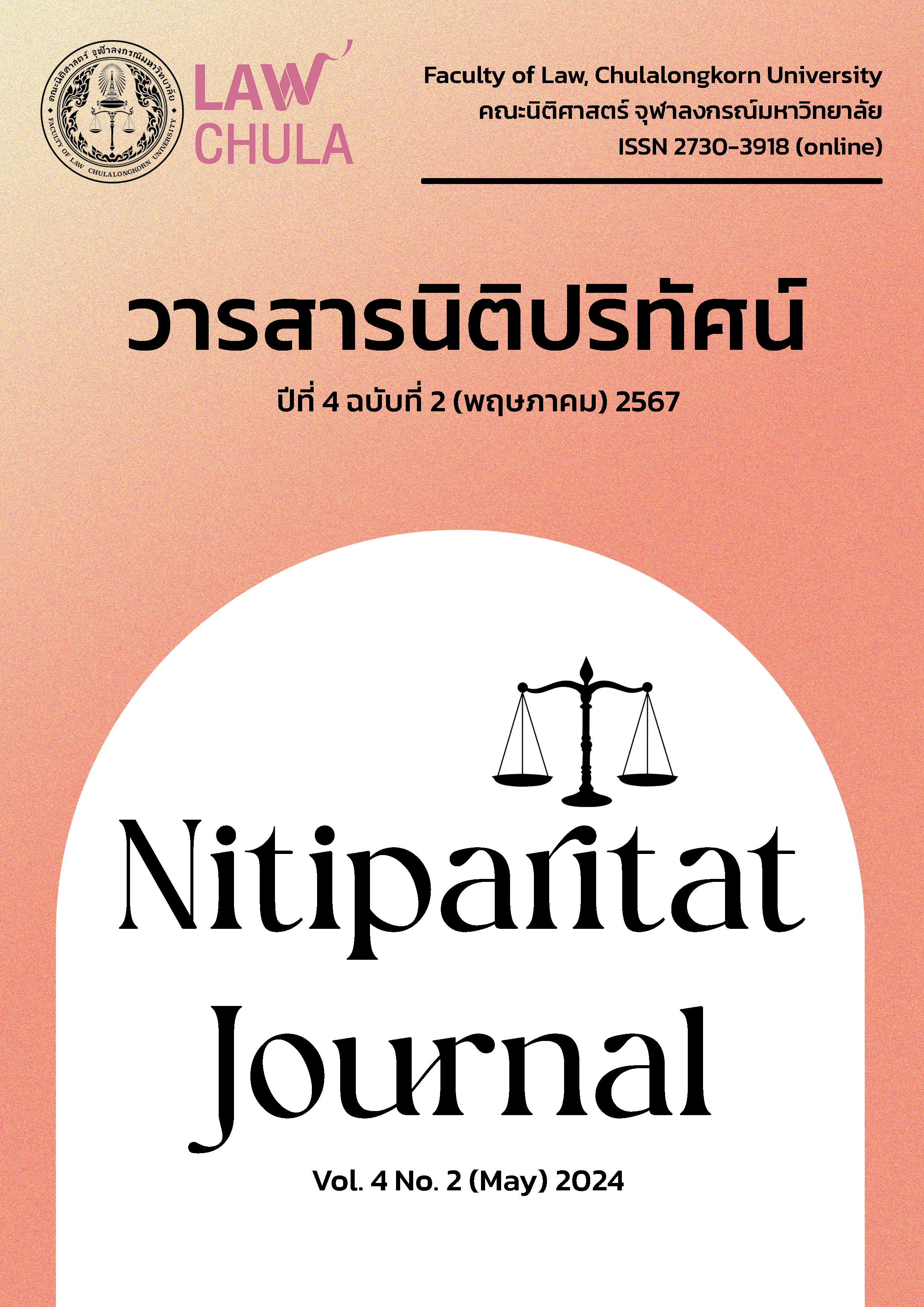การวิเคราะห์เชิงเปรียบเทียบและการศึกษาทางบริบทต่อกฎแห่งการรับรู้ (Rule of Recognition) ในสังคมไทย
คำสำคัญ:
กฎแห่งการรับรู้, การยอมทางสังคม, ระบบกฎหมาย, อำนาจนิติบัญญัติ, การสมรสของบุคคลเพศเดียวกันบทคัดย่อ
การศึกษาครั้งนี้เป็นการสำรวจแนวคิดของ เอช แอล เอ ฮาร์ท (H.L.A. Hart) เกี่ยวกับกฎแห่งการรับรู้ (Rule of Recognition) และการปรับใช้ในระบบกฎหมายของชุมชนขนาดเล็กและสังคมร่วมสมัย ฮาร์ท ให้เหตุผลว่าการควบคุมทางสังคมอาศัยการยึดมั่นร่วมกันต่อกฎหลักของพันธกรณีภายในชุมชนที่ใกล้ชิดกัน อย่างไรก็ตาม เมื่อสังคมมีขนาดใหญ่ขึ้น ความไม่แน่นอนเกี่ยวกับธรรมชาติและการบังคับใช้กฎเกณฑ์ก็เกิดขึ้น ฮาร์ท เสนอกฎ 'กฎแห่งการรับรู้' ซึ่งเป็นกฎลำดับรองที่จะเป็นตัวกำหนดกฎที่ถูกต้องและมีผลผูกพัน กฎแห่งการรับรู้ที่จะรับรองความเป็นกฎหมายที่สมบูรณ์นั้นอาจมีหลายรูปแบบและถูกกำหนดโดยผู้มีบทบาทสำคัญ เช่น ศาล เจ้าพนักงาน และบุคคลใด ๆ ซึ่งในกรอบกฎหมายสมัยใหม่เป็นการครอบคลุมแหล่งที่มาทางกฎหมายทั้งหมด การทำความเข้าใจกฎแห่งการรับรู้เป็นสิ่งสำคัญในการทำความเข้าใจว่าบรรทัดฐานทางกฎหมายได้มาซึ่งสถานะที่เชื่อถือได้อย่างไร โดยเฉพาะอย่างยิ่งในสภาพแวดล้อมทางกฎหมายของประเทศไทย
อย่างไรก็ตาม พบว่ายังมีช่องว่างและการวิพากษ์วิจารณ์ที่ต้องถูกพิจารณา ซึ่งการศึกษานี้มีการศึกษาการตีความของนักวิชาการอีกสามคนที่เกี่ยวข้องกับกฎแห่งการรับรอง ได้แก่ อดัม เพอร์รี่ (Adam Perry) ซิลวี เดลาครัวซ์ (Sylvie Delacroix) และอดัม ทัคเกอร์ (Adam Tucker) โดยเพอร์รี่ให้เหตุผลว่า การอาศัยการยอมรับทางสังคมเพียงอย่างเดียวอาจจำกัดเสถียรภาพและความสอดคล้องกันของกฎแห่งการรับรู้ เดลาครัวซ์เน้นย้ำถึงความจำเป็นในการคำนึงถึงแนวทางปฏิบัติและประเพณีที่ไม่เป็นทางการ นอกเหนือจากการออกกฎหมายที่เป็นทางการ ในบริบทของประเทศไทย กฎแห่งการรับรู้เผชิญกับความท้าทายในการปฏิบัติตามอำนาจนิติบัญญัติและการรองรับลักษณะเฉพาะทางวัฒนธรรม การวิพากษ์วิจารณ์เหล่านี้เน้นย้ำถึงความจำเป็นในการทำความเข้าใจกฎแห่งการรับรู้ที่ครอบคลุมและละเอียดอ่อนมากขึ้นด้วยการผสมผสานบรรทัดฐาน แนวทางปฏิบัติที่ไม่เป็นทางการ และการพัฒนาต่อการยอมรับทางสังคม
โดยสรุป กฎการแห่งการรับรู้ของฮาร์ทมอบกรอบแนวคิดที่มีคุณค่า แต่การนำไปปฏิบัติจริงเผยให้เห็นช่องว่างและข้อจำกัด ซึ่งข้อมูลเชิงลึกจากนักวิชาการ เช่น เพอร์รี่ เดลาครัวซ์ และ ทัคเกอร์ เน้นย้ำถึงความสำคัญของการพิจารณาพฤติกรรมทางสังคม แนวทางปฏิบัติที่ไม่เป็นทางการ ลักษณะเฉพาะทางวัฒนธรรม และการมีส่วนร่วมกับอำนาจนิติบัญญัติของรัฐสภา การแก้ไขช่องว่างเหล่านี้จะช่วยให้เกิดความเข้าใจที่ครอบคลุมมากขึ้นเกี่ยวกับกฎแห่งการรับรู้เพื่อเพิ่มพูนความสัมพันธ์ต่อระบบกฎหมายร่วมสมัยและในบริบทของประเทศไทย
เอกสารอ้างอิง
Marshall B. Clinard and Robert F. Meier, Sociology of Deviant Behavior (14th edn, Wadsworth Cengage Learning 2011) 4.
Aja Romano, ‘A history of wokeness’ (Vox, 9 October 2020) <https://www.vox.com/culture/21437879/stay-woke-wokeness-history-origin-evolution-controversy> accessed 24 May 2023.
HLA Hart, The Concept of Law (2nd edn, Clarendon Press 1994) 91.
Ibid 92.
Ibid 94.
Ibid 94.
Ibid 101.
Ibid 100.
HLA Hart, The Concept of Law (2nd edn, Clarendon Press 1994) 116.
HLA Hart, The Concept of Law (2nd edn, Clarendon Press 1994) 102-103.
Ibid 115.
Ibid 197.
David Masci, Elizabeth Podrebarac Sciupac, and Michael Lipka, ‘Same-Sex Marriage Around the World’ (Pew Research Center, 28 October 2019) <https://policycommons.net/artifacts/616530/same-sex-marriage-around-the-world/1597190/> accessed 23 May 2023.
Thuttai Keeratipongpaiboon, ‘LGBT+ เปิดกว้างสู่สังคมที่เท่าเทียม พึ่งพาแต่ไม่พึ่งพิง’ (Thaipublica, 25 January 2022) <https://thaipublica.org/2022/01/future-thailand-thuttai-keeratipongpaiboon/> accessed 23 May 2023.
BBC Thai, ‘ร่าง พ.ร.บ. สมรสเท่าเทียม-คู่ชีวิต : ต้องผ่านขั้นตอนอะไรบ้าง ก่อนบังคับใช้เป็นกฎหมาย’ (BBC Thai, 15 June 2022) <https://www.bbc.com/thai/thailand-61808097> accessed 24 May 2023.
Home Office, The Report of the Departmental Committee on Homosexual Offences and Prostitution (Cmnd 247, 1957) para 61.
HLA Hart, The Concept of Law (2nd edn, Clarendon Press 1994) 155.
Zhaoyan Duan, ‘The Concrete Embodiment of Hierarchy in Thailand’s Society and Its Analysis’ (2019) 378 Advances in Social Science, Education and Humanities Research 887, 887-888.
HLA Hart, The Concept of Law (2nd edn, Clarendon Press 1994) 94.
Robert Stalnaker, ‘Common Ground’ (2002) 25(5/6) Linguistics and Philosophy 701, 702-720.
HLA Hart, The Concept of Law (2nd edn, Clarendon Press 1994) 116.
Constitution of the Kingdom of Thailand B.E. 2560 (THA)
Adam Perry, ‘Aspect of Social Rules’ (2015) 35 Oxford Journal of Legal Studies 283, 284-293.
Sylvie Delacroix, ‘Law and Habits’ (2017) 37 Oxford Journal of Legal Studies 660, 662-685.
Adam Tucker, ‘Uncertainty in the Rule of Recognition and in the Doctrine of Parliamentary Sovereignty’ (2011) 31 Oxford Journal of Legal Studies 61, 71-72.
Pudit Ovattananakhun, ‘Application of Natural Law Doctrine in Constitutional Court Decision No. 20/2564: A Jurisprudential Analysis’ (2022) 2 Thai Legal Studies 227, 244-247.
Decision No 20/2564 (Decision on ‘Does Article 1448 of the Commercial and Civil Code contradict or conflict with Articles 25, 26, and 27 (1) (2) and (3) of the Constitution?’) (17 November 2021) 11 <https://www.constitutionalcourt.or.th/occ_web/download/article/article_20211221153745.pdf> accessed 24 May 2023.
ดาวน์โหลด
เผยแพร่แล้ว
รูปแบบการอ้างอิง
ฉบับ
ประเภทบทความ
สัญญาอนุญาต
ลิขสิทธิ์ (c) 2024 พัชรากร ชัยมะโน, พีรณุช หัตถสงเคราะห์ , สิริกาญจน์ จึงธีรพานิช , วรพล รัตนวราวงศ์

อนุญาตภายใต้เงื่อนไข Creative Commons Attribution-NonCommercial-NoDerivatives 4.0 International License.
บทความที่เสนอเพื่อพิจารณาการตีพิมพ์ต้องไม่มีลักษณะคัดลอกผลงานวิชาการและต้องไม่มีเนื้อหาที่ละเมิดลิขสิทธิ์



